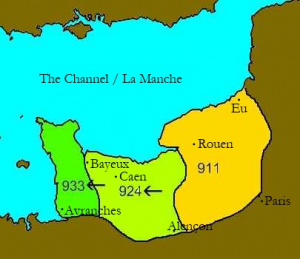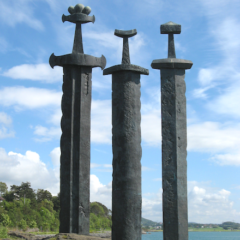Normans are descendants of Nordic Viking settlers. At the beginning of the tenth century a Viking band of Danes and Norwegians plundered the lower reaches of the Seine over several summers. In 911, Charles „le Simple“, the then Frankish king, invited the leader of these Vikings, a Norwegian named Rollo, to settle on the lower reaches of the Seine as his vassal. Rollo remained in Rouen and developed the former frankish Earldom Normandy into a flourishing state, which thanks to his successors, rapidly expanded westwards to Brittany. The Normans did not consider themselves as being subjects of the King of the Franks and established Normandy as an independent duchy. In fact, the few former vikings established themselves as rulers over their frankish subjects. That’s why „Norman“ is not synonymous with „Viking“.

The development of the medieval Normandy
(Graphic: U. Pape)
Of the Norman dukes, the seventh successor to Rollo is especially interesting to us: Duke William II, called “The Bastard” (because he was illegitimate) and later called „The Conqueror“ (for obvious reasons!) became the conqueror of England. In the autumn of 1066, he crossed the English Channel with a fleet of several hundred ships, defeated the Anglo-Saxons on the 14th of October 1066 near Hastings, and finally was crowned King of England and Normandy as William I. Other Norman nobles, however, emerged very differently. Some accompanied pilgrimages on their journeys to the Holy Land as “body-guards”. Some remained in southern Italy and served as warriors to the Pope and other princes served the one who paid the most – and readily changed sides for this purpose. Finally, by the order of the Pope, they conquered Sicily, then under Arab control, and established its first Christian kingdom (Robert and Roger de Hauteville) in February 1091.
